How to Grow Ajwain Plant From Seeds
Ajwain is a spice that originates from India and has been used for centuries in Ayurvedic medicine. It’s also popular in Indian cooking. Ajwain seeds can be planted indoors or outdoors and need plenty of sunlight to grow well. This post will provide you with all the information you’ll need on How to Grow Ajwain Plant From Seeds.
This blog will teach you how to get your hands on some ajwain seeds quickly and what type of environment they prefer. We’ll also show you step-by-step instructions on how to plant them, water them properly, and give them enough light so that they don’t die off too quickly!
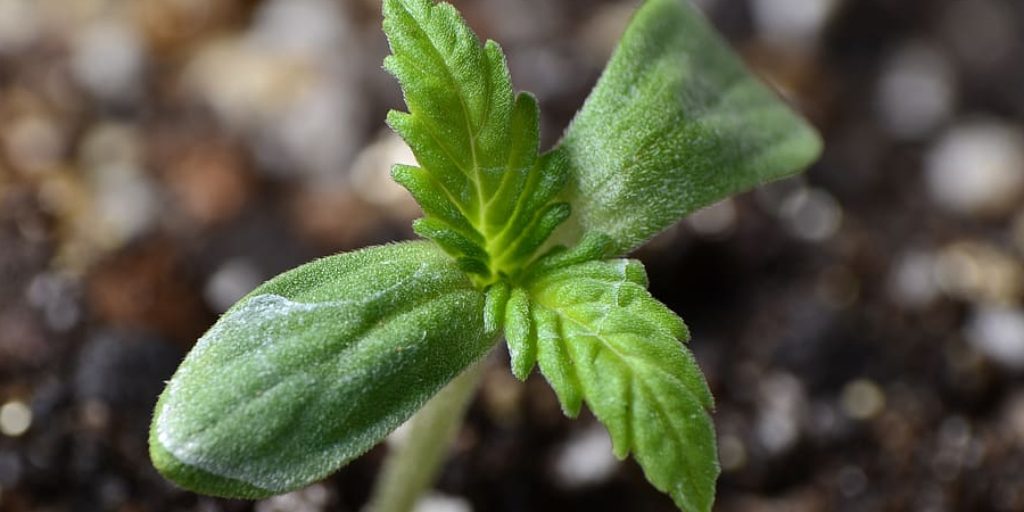
Summary: If you’re looking to grow ajwain plant from seeds, follow these simple instructions: 1. Start by collecting a few fresh ajwain seeds from a nearby herb garden. 2. Plant the seeds in a pot of soil and water them regularly. 3. Once they’ve germinated, watch as the plants grow and develop into tall, colorful stalks. 4. When the ajwain plants have reached their desired height, harvest the Ajwain seeds and enjoy your new herb garden addition!
5 Reasons Why You Should Grow Ajwain Plant?
Ajwain plant is a hardy annual, which grows in hot weather and does not require much attention. Seeds can be harvested from this shrub for cooking purposes or to use as a home remedy. Ajwain seeds have been used for centuries in folk medicine and food recipes from around the world.
1. Abundant Seed Production:
Ajwain plant is a prolific seed producer. This shrub can grow up to three feet tall and features pink or white flowers that cause the seeds to germinate rapidly after planting. Once established, the plant’s deep taproot helps create healthy plants that require minimal care. Each flower can produce as many as 200 seeds, harvested for cooking or other uses.
2. Remedy For Illness/Disease:
Ajwain seeds are not only effective in curing various diseases and disorders such as headaches, toothaches, stomach aches, earaches, and respiratory problems like congestion, but they also help in childbirth by inducing labor and speeding up delivery. Ajwain seeds are also known to soothe coughs and aid in digestion, making them a perfect addition to soups for those suffering from stomach discomfort.
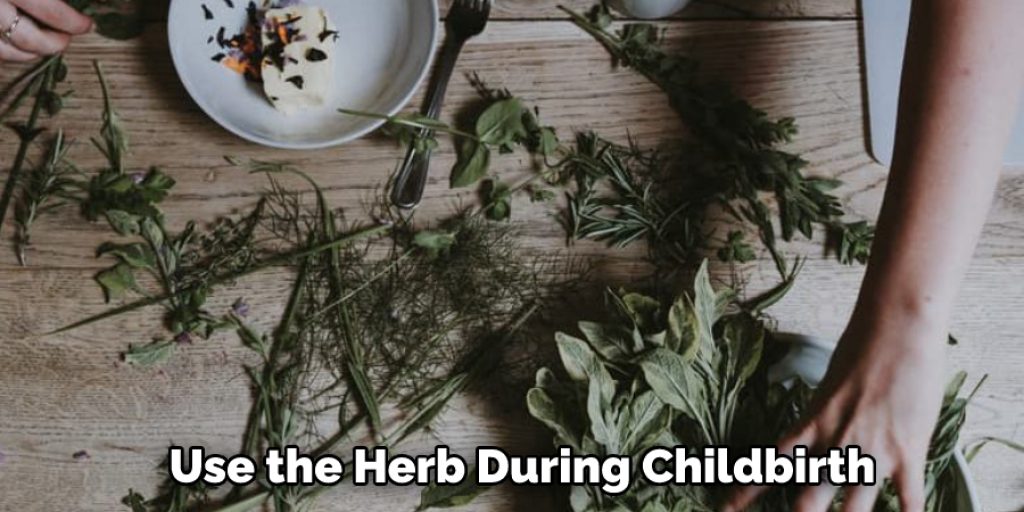
3. Variety Of Uses:
This shrub has a spicy odor and sticky resin that make it useful in several ways. For example, Ajwain seeds can be used for flavoring curries, stews, or soups. They can also be made into a paste and applied to the skin for their antibacterial properties.
4. Natural Insect Repellent:
The strong smell created by the seeds is also effective at deterring insects. As a result, ajwain seeds can be used to repel fleas and ticks from your pets. In addition, dipping a cotton ball in the seeds’ oil and dabbing it underneath your pet’s chin is an effective way to keep away flies.
5. Easy Care:
Although the Ajwain plant is easy to grow in most climates, it does require full sun and well-drained soil for optimum growth. Seeds can be harvested following the first frost of autumn, after about three months of development.
5 Benefits of Ajwain plant
Here are 5 benefits of the Ajwain plant:
- Digestion: Ajwain is known for its digestive properties due to the presence of thymol, which helps in the secretion of digestive juices that aid in the digestion of food. It also helps to relieve flatulence, indigestion, and other stomach-related issues.
- Respiratory Health: Ajwain is also known to have properties that can help with respiratory health. It acts as a bronchodilator and expectorant, helping to clear the airways of mucus and other obstructions. It can also help to prevent asthma, bronchitis, and other respiratory ailments.
- Pain Relief: Ajwain has analgesic and anti-inflammatory properties, making it beneficial for pain relief. It can be used topically as an ointment or applied in the form of a poultice to areas affected by pain and inflammation.
- Anti-bacterial: Ajwain has anti-bacterial properties that can help prevent and treat infections. It can be used to treat skin, mouth, and respiratory infections.
- Weight Loss: Ajwain can be used to aid in weight loss due to its ability to improve digestion and boost metabolism. It can also help to reduce appetite, making it easier to stick to a weight loss diet.
When to Plant Ajwain Seeds?
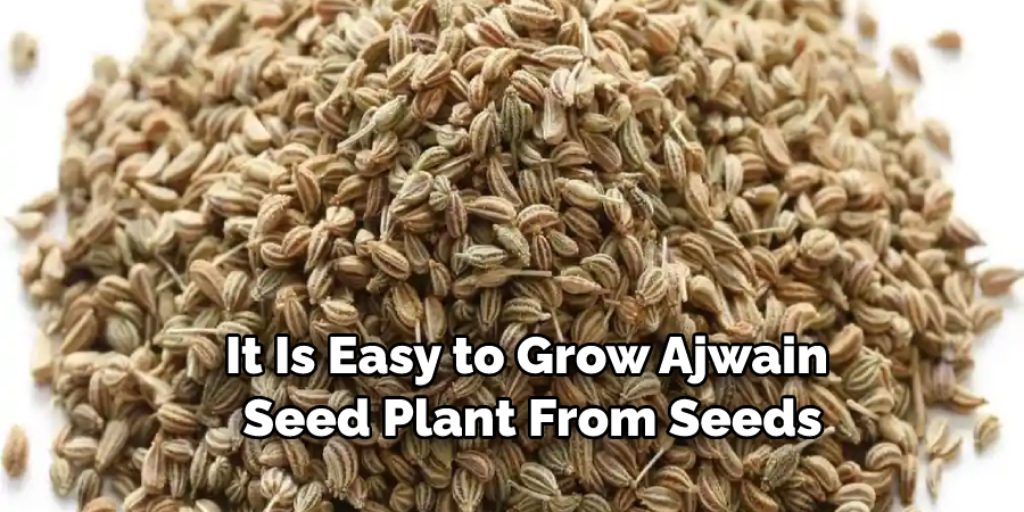
It is easy to grow ajwain seed plant from seeds. However, Ajwain seeds should be sown during the spring season so that the final product, the leaves, and fruits of the ajwain plant, can mature by either autumn or winter.
Soil for Planting Seeds. Since ajwain seeds need humus and moisture, the best soil to plant them in is a mixture of clay and sand (1:3). You can also use topsoil for this purpose.
Step by Step Guide: How to Grow Ajwain Plant From Seeds
Step 1: Find Seeds for Ajwain Plant
The essential step in the process of growing the Ajwain plant is finding good quality seeds. You can find these either in your kitchen or you can find them at your local health food store. If you do not want to buy already packaged ones, look around for some deals on bulk spices and get spices in seed form.
Step 2: Soak Seeds in Water to Maximize Germination Rates
The best way to get your Ajwain seeds ready for optimal germination is by soaking them overnight. This will make them more pliable and allow for an easier time when it comes down to replanting the seeds later on.
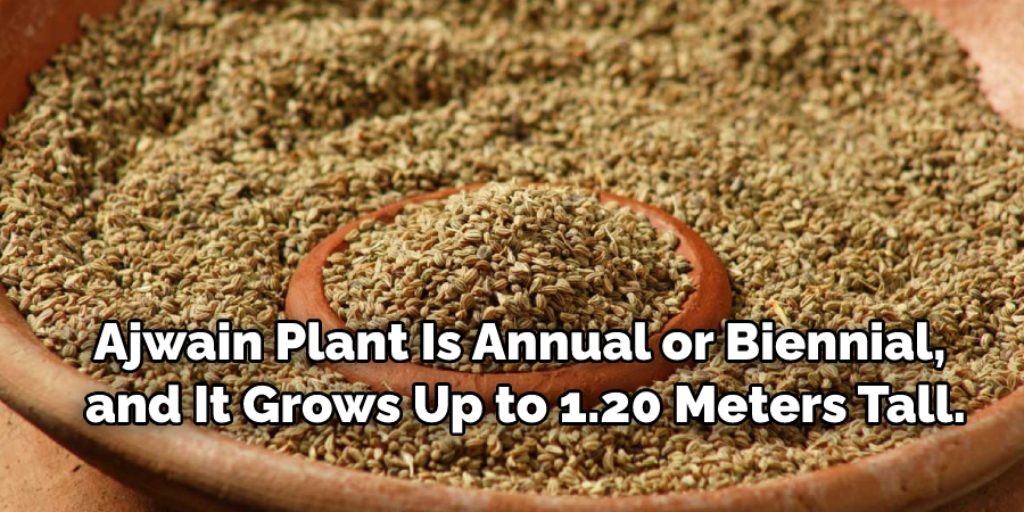
Step 3: Get A Pot, Some Soil, and a Growing Space
In order to start growing your Ajwain seeds, you will need to obtain some soil, a pot, and something that can be used as a marker. The marker is essential because you want to be able to identify which Ajwain seed is the parent of which plant. This is useful when it comes time to replant the baby Ajwain plants.
Step 4: Plant and Keep Tended
Now that you have your seeds and soil-plant them in their respective pots and keep them tended. This process should be pretty simple as long as you water them daily and keep pests at bay. Before you get to harvest, the length of time will be around the same time it takes for your other spices to grow fully.
Step 5: Replanting Once You Have The Seeds in Place
Your Ajwain plant will have good roots in place when you are ready to replant, so remove it from its pot and set up a growing area for it at least two feet away from its parent plant. You do not want to put it too close because the seedlings will need room to grow and live independently.
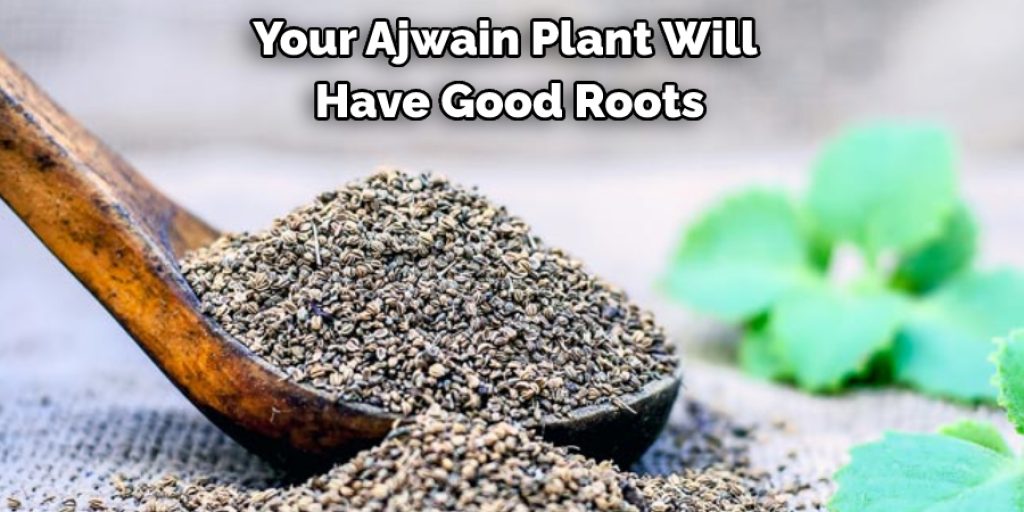
Some Facts About Ajwain Plant:
1. Ajwain plant is annual or biennial, and It grows up to 1.20 meters tall.
2. Ajwain seeds are popularly known as carom seeds.
3. Ajwain leaves are used to make medicine.
4. Ajwain leaves are used to add flavor to cooking.
5. Ajwain is a rich source of minerals, carbohydrates, and dietary fiber.
6. Ajwain leaves are bitter, so they are advised not to eat by themselves or used as salad. Instead, it should be mixed with other vegetables.
Things to Consider When Growing Ajwain Plant From Seeds:
1. Choose a Quality Seed Supplier.
When looking for ajwain seeds, select a reputable and reliable supplier. This will ensure the quality of the seeds and increase your chances of success in growing the plants.
2. Soil Preparation is Key.
Ajwain plants thrive in soil that is light and well-drained. Amend your garden soil with organic matter like compost or manure to provide nutrients and drainage. If you are planting the seeds in a pot or container, use a soil mix designed explicitly for herbs.
3. Plant Ajwain Seeds in Spring or Fall.
Ajwain seeds germinate best when the soil temperature is between 65 and 85 degrees Fahrenheit. Therefore, plant the seeds in spring or fall, when the temperatures are moderate.
4. Water Regularly, But Not Too Much.
Ajwain plants need regular watering, but be careful not to overwater them, as this can cause the roots to rot. Make sure the soil is evenly moist but not wet.
5. Fertilize Twice a Month.
Ajwain plants need nitrogen, phosphorus, and potassium to thrive. Add a balanced organic fertilizer to the soil twice a month to ensure the plants get the nutrients they need.
6. Harvest Ajwain When the Plants are Fully Grown.
Ajwain plants can be harvested when full-grown, typically around 8-10 weeks after planting the seeds. The leaves and flowers can be harvested for use in cooking. Be sure to harvest regularly to keep the plants from flowering and seeding.
7. Choose the Right Growing Medium.
Ajwain plants can be grown in soil or a pot or a container. If growing them in soil, choose a light and well-drained soil mix. If growing them in a pot or container, use a soil mix specifically designed for herbs.
You can successfully grow ajwain plants from seeds by following these simple steps. Enjoy adding this flavorful herb to your culinary creations!
Tips to Care for Your Ajwain Plant When Growing:
1. Ajwain plants need full sun. Therefore, they will do best if you place them in a location where they will receive six or more hours of direct sunlight each day.
2. Ajwain plants need regular watering. Keep the soil evenly moist but not wet, and water regularly.
3. Ajwain plants need nitrogen, phosphorus, and potassium to thrive. Add a balanced organic fertilizer to the soil twice a month to ensure the plants get the nutrients they need.
4. Ajwain plants can be harvested when full-grown, typically around 8-10 weeks after planting the seeds. The leaves and flowers can be harvested for use in cooking. Be sure to harvest regularly to keep the plants from flowering and seeding.
5. Ajwain plants can be grown in soil or a pot or container. If growing them in soil, choose a light and well-drained soil mix. If growing them in a pot or container, use a soil mix designed explicitly for herbs.
You can successfully grow ajwain plants from seeds by following these simple tips. Then, enjoy adding this flavorful herb to your culinary creations!
Frequently Asked Questions
Can you grow ajwain Plant from seeds?
Ajwain is a plant that is used in Indian cuisine. It is a member of the parsley family and can be grown from seeds.
To grow Ajwain, you will need to sow the seeds in early spring and water them regularly. Once the plants have grown, you will need to harvest the ajwain leaves by cutting them off at the base of the plant.
Is ajwain plant good for home?
Ajwain is a plant that is used in traditional Indian medicine. It is known to have anti-inflammatory properties and can be used to treat a variety of health problems. Some benefits of Ajwain include:
• It can help reduce pain and inflammation.
• It can help improve the symptoms of asthma and other respiratory problems.
• It can improve the symptoms of arthritis.
Why is my ajwain plant dying?
Ajwain is a type of plant that is used in traditional Indian medicine to treat various ailments. It is also known as the holy basil, tulsi, or holy herb. There are several reasons why Ajwain may be dying:
1. The plant may not have been watered properly.
2. The plant may have been overwatered or watered too much.
3. The plant may have been damaged by pests or diseases.
4. The plant may not have been grown in a suitable environment (temperature, light, etc.).
Conclusion:
Ajwain seeds are a multipurpose solution for illnesses, cooking and insect repelling. This shrub can grow in just about any climate, making it the perfect garden addition. To successfully grow the Ajwain Plant, you need to follow these steps. First, soak your seeds overnight before planting them in soil that has been mixed with compost or manure.
If you live in an area with no winter freezes, then just place your plants outside after they sprout up about 6 inches tall. The last step is to water them well but infrequently because too much water will cause root rot, which could kill the whole plant! Thank you for reading, and we hope that this article on how to grow ajwain plant from seeds was beneficial!




